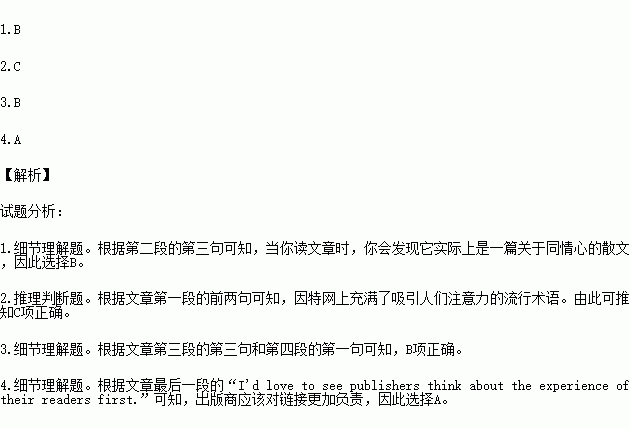题目内容
阅读理解.
The Internet is full of headlines that grab your attention with buzzwords (流行术语). But often when we click through, we find the content hardly delivers and it wastes our time. We close the page, feeling we've been cheated. These types of headlines are called “click bait”.
A headline on Business Insider reads:“This phrase will make you seem more polite”. First, when you click through, you find another headline:“Four words to seem more polite”. Then, on reading the article, you find it's actually an essay about sympathy. And what are the four words? They're “Wow, that sounds hard”. On some video websites, you might encounter headlines such as “Here's what happens when six puppies visited a campus”. It turns out that it's just some uneventful dog footage (连续镜头).
Nowadays, with the popularity of social media, many news outlets tweet (推送) click bait links to their stories. These tweets take advantage of the curiosity gap or attempt to draw the reader into a story using a question in the headline. These click bait headlines are so annoying that someone is attempting to save people's time by exposing news outlet click bait through social media. The Twitter account @ SavedYouAClick, run by Jake Beckman, is one such example.
Beckman's method is to grab tweets linking to a story and retweet them with a click?saving comment. For example, CNET tweeted “So iOS 8 appears to be jailbreakable but ...”, with a link to its coverage of Apple's product announcements. Beckman retweeted it with this comment attached: “...it hasn't been jailbroken yet.”
Since founding the account, Beckman's Twitter experiment has brought him more than 131,000 followers. Beckman said,“@ SavedYouAClick is just my way of trying to help the Internet be less terrible.” Asked about his goal, he said,“I'd love to see publishers think about the experience of their readers first. I think there's an enormous opportunity for publishers to provide readers with informative updates that include links so you can click through and read more.”
1.The article on Business Insider turns out to be________.
A.useful suggestions on politeness
B.an essay about another topic
C.an article hard to understand
D.a link to a video website
2.Why are readers often cheated by tricky headlines?
A.Social media has become more popular.
B.Readers have questions to be solved.
C.Such headlines are fairly attractive.
D.There're always stories behind them.
3.Beckman attached his comment to CNET's tweet to ______.
A.criticize CNET
B.save readers' time
C.advertise Apple's new product
D.tell readers something about iOS 8
4.In the last paragraph, Beckman appeals that ________.
A.publishers should be more responsible for the link
B.readers think about their needs before reading
C.publishers provide more information for readers
D.people work together to make the Internet less terrible
 心算口算巧算一课一练系列答案
心算口算巧算一课一练系列答案

 and cast my line
and cast my line